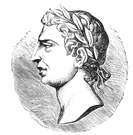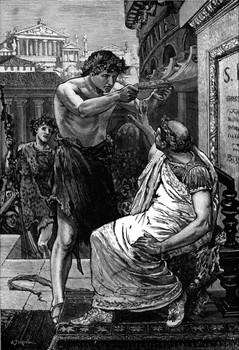The Life of Julius Caesar
|
Share This Page
|
|
|
|
|
|
|
Follow This Site

|
 |
|
|
Part 4: Opponents of Caesar
 An outspoken opponent of Caesar for many years had been Cato, a brilliant speaker who saw in Caesar a man who would put himself first, before Rome or its people. Cato, already famous before Caesar arrived on the scene, allied himself with Caesar's political opponents. After Caesar's string of victories in the East, Cato and others of Caesar's opponents fled to Africa. Caesar, having returned to Rome, went to Africa and defeated his opponents there, at the Battle of Thapsus. Cato, unable to bear the shame of being defeated or pardoned, killed himself.
An outspoken opponent of Caesar for many years had been Cato, a brilliant speaker who saw in Caesar a man who would put himself first, before Rome or its people. Cato, already famous before Caesar arrived on the scene, allied himself with Caesar's political opponents. After Caesar's string of victories in the East, Cato and others of Caesar's opponents fled to Africa. Caesar, having returned to Rome, went to Africa and defeated his opponents there, at the Battle of Thapsus. Cato, unable to bear the shame of being defeated or pardoned, killed himself.
Another group of opponents of Caesar was still in possession of some power at this time. Among these men was Senator Gaius Cassius Longinus, who had sided with both Crassus and Pompey against Caesar.  Cassius feared that Caesar would proclaim himself king, something that Senators and Romans alike desperately wanted to avoid. The seven kings of Rome had been especially cruel, both their foreign enemies and to the people Rome. The Roman Republic was formed in large part to prevent another king from taking power, and the Senate considered themselves guardians of that trust. In Caesar, Cassius, Cato, and others (including Brutus) saw a new candidate for kingship and a return to the cruelty of the past. A king, after all, or a dictator had to answer to no one. The Republic and its Senate were founded on the idea that people could have a say in their government and that they would not be commanded or dictated to by someone who has claimed power by way of divine guidance or military superiority.
Cassius feared that Caesar would proclaim himself king, something that Senators and Romans alike desperately wanted to avoid. The seven kings of Rome had been especially cruel, both their foreign enemies and to the people Rome. The Roman Republic was formed in large part to prevent another king from taking power, and the Senate considered themselves guardians of that trust. In Caesar, Cassius, Cato, and others (including Brutus) saw a new candidate for kingship and a return to the cruelty of the past. A king, after all, or a dictator had to answer to no one. The Republic and its Senate were founded on the idea that people could have a say in their government and that they would not be commanded or dictated to by someone who has claimed power by way of divine guidance or military superiority.
With few opponents left, Caesar got down to the business of governing Rome (by himself, of course). During this time, he did many things that endeared him to the soldiers and to the common people of Rome. He got Rome out of the enormous financial debt that it had been in (in no small part because of the civil wars that he helped create). He increased the number of Senators (with men favorable him taking the new seats). He regulated the amount of grain that could go out to people in need (so that the corruption of past years would not favor the rich anymore). He also reformed the calendar, bringing it up-to-date and ending many years of confusion.
Among other things he did, these reforms alienated many of the rich and powerful who had supported Crassus, Pompey, Sulla, and others who had stood in Caesar's way. Gnaeus and Sextus, Pompey's sons, led a revolt in Spain. Caesar personally led the army that defeated them.
Caesar also had coins made with his face on them and had statues of him dressed up just like statues of the gods. He was also being granted many new titles and privileges by the Senate, including the title of "the  unconquerable god" and the right to wear a purple and gold toga and sit in a gilded chair at all public functions. Two tribunes, Gaius Marullus and Lucius Flavius, stated their opposition to such titles and privileges and found themselves removed from the Senate.
unconquerable god" and the right to wear a purple and gold toga and sit in a gilded chair at all public functions. Two tribunes, Gaius Marullus and Lucius Flavius, stated their opposition to such titles and privileges and found themselves removed from the Senate.
In February of 44 B.C., Caesar was named dictator for life. On February 15 of that year, at the feat of Lupercalia, Caesar's trusted lieutenant, Marc Antony, offered the dictator a crown. Caesar, seeing that even though he had tremendous popular support his people still didn't want a king, refused the crown--three times.
Next page > Death of Caesar > Page 1, 2, 3, 4, 5